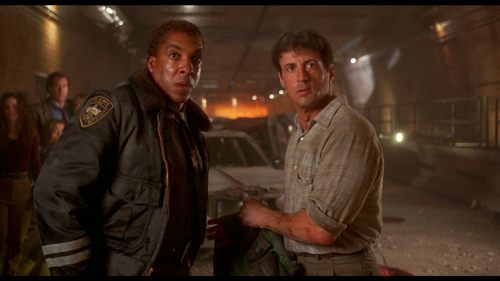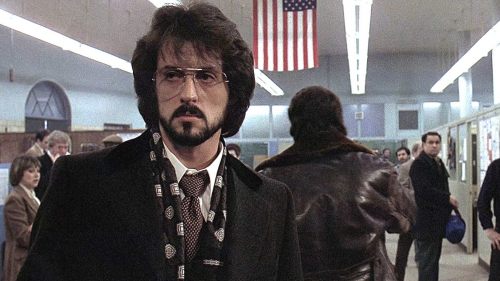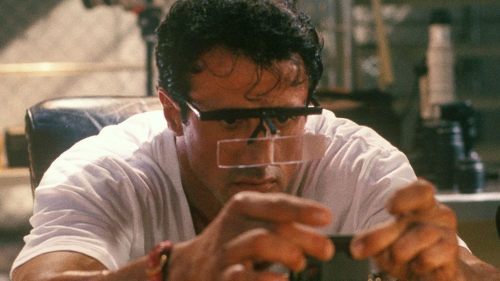Rambo Has Always Been Right Wing
When Sylvester Stallone saw the first three-and-a-half hour work print of First Blood, it reportedly made him sick. The actor thought the mournful action movie polemic about post-Nam PTSD was a "career killer", to the point that Stallone actually attempted to buy all the prints of the picture and burn them, just so nobody could ever see it again. Director Ted Kotcheff – along with screenwriters Michael Kozoll and William Sackheim (not to mention a lengthy re-write by Stallone himself) – transformed David Morrell's already angry book into a literal suicide mission, which ended with Stallone's titular drifter taking his own life after being backed into a corner by the local sheriff (Brian Dennehy) and his tyrannical deputies. A good deal of that still remained in the final cut, only the movie was re-worked into a 93-minute thriller that would become a template for future action movies, becoming a hit and spawning three sequels after Rambo is arrested instead of terminated.
First Blood paints systems of authority as being utterly wrongheaded and cruel, as these lawmen push John Rambo until he breaks and sets their Pacific Northwest hamlet ablaze. However, the movie still glorifies militaristic might in its own way, painting Stallone's character as a soldier so expertly trained that only the man who created him – Colonel Trautman (Richard Crenna, playing a Green Beret iteration of Dr. Frankenstein) – can help these blue collar crime fighters reel him in. To be fair, the movie is far less violent than Morrell's book (which practically paints Rambo as a kill-crazy maniac), but there was a distinct symbol of nationalistic might that was minted, which flies in the face of the text’s anti-war protest. That is to say: First Blood may be a classic, but it’s a bit mush-mouthed, politically speaking.
Over the weekend, it was announced that Sylvester Stallone is currently working on the script for Rambo V, which would see the one man army taking on Mexican cartels. The full synopsis goes:
"...when the daughter of one of his friends is kidnapped, Rambo, who has been working on a ranch, crosses the U.S.-Mexican border and quickly finds himself up against the full might of one of Mexico’s most violent cartels."
Beyond being a bit of a narrative head-scratcher – as the epilogue of the last film, Rambo, saw John returning home after mowing down many cartoonishly cruel Burmese enemies, bringing a rather satisfying close to his story – the fact that Stallone, an avowed Trump supporter, is writing the screenplay made many fans momentarily pause. After all, one of our current President's main goals is to "build a wall" between the US and Mexico, in an attempt to ward off "dangerous" illegal immigrants. Do we really need John Rambo embarking on a mission whose endgame would make Donald Trump smile?
Yet the simple fact remains: this franchise has long been one of dubious Republican ideals. The James Cameron-penned/George Cosmatos-helmed First Blood: Part II discarded the wounded animal our favorite Congressional Medal of Honor winner was in the original, in favor of an oiled, machine gun-toting massacre artist, waging his own Vietnam War in the name of bringing home POWs. Cosmatos' movie was arguably the apex of '80s American action filmmaking, to the point that Ronald Reagan even cited it as informing how he handled a real world hostage crisis. Sure, there were corrupt operatives and John was technically an agent of good, but First Blood: Part II was an unabashedly jingoistic piece of pop.
To take this notion a step further, where the cinematic transmutation of First Blood saw Rambo taking down one of the fundamental elements of the US military structure (the National Guard), that film could also be viewed as an allegory for Reagan’s political rhetoric that blamed his predecessor (the Carter Administration) for rendering America fragile and unprepared for any threat it may face at home. In turn, First Blood: Part II becomes the quintessential representation of American foreign policy during the Reagan years, to the point that the former President actually referred to the movie during his own speeches. During his 1985 Labor Day address, Reagan stated that he would clean up the federal tax system “in the spirit of Rambo”. The president also used Rambo as a stand-in for his views toward the Soviet Union, Middle East, and Nicaragua.
Perhaps this is why Rambo III full-on literalized Reagan's ideology, as he takes down a filmic Cold War representation of the "Evil Empire". Rambo heads to Afghanistan to rescue Trautman, who’s captured by the invading Soviet army, thwarting an entire Russian squad (including heavy artillery, such as tanks and a helicopter). In an ironic twist, by the time Rambo III was released in ‘88, the USSR had already announced its withdrawal of troops from Afghanistan. The movie was less of a financial success than originally hoped for, causing Stallone to jokingly cite Mikhail Gorbachev as being the one man who could take down the otherwise invincible John Rambo. Even more ironic, Rambo III was dedicated “to the gallant people of Afghanistan”, whom America would find themselves embroiled in a conflict with decades later.
Like First Blood, Rambo – the franchise's fourth film – doesn't possess a hefty political text, but once you take into account that John is now mowing down Burmese soldiers as he aids religious missionaries, there's an odd religious angle that was absent in these films before. Suddenly, all the talks with the Vietnam Vet about rediscovering a sense of purpose (instead of wrangling cobras for local cheap thrills) take on a different meaning, as he protects these messengers of God against the bloodthirsty local forces. Unintentional or not, John Rambo is now a representative of miraculous intervention: something the Christian Right is always extolling the virtue of.
So, while Rambo taking on Trump's imaginary enemies may ruffle the feathers of some film critics, they’ve also been cheering on a Right Wing champion the entire time. Rambo V is only a dramatic evolution of where the character's always been headed, for better or worse. Furthermore, like Rocky Balboa, Stallone has always been incredibly protective over his icon, and is again using him to channel his personal beliefs. Whether a viewer chooses to support that or not is totally up to them (especially during these overwhelmingly contentious times), but acting like this is any sort of shift from the political space the character previously inhabited seems like a denial of John Rambo's checkered past to begin with.



